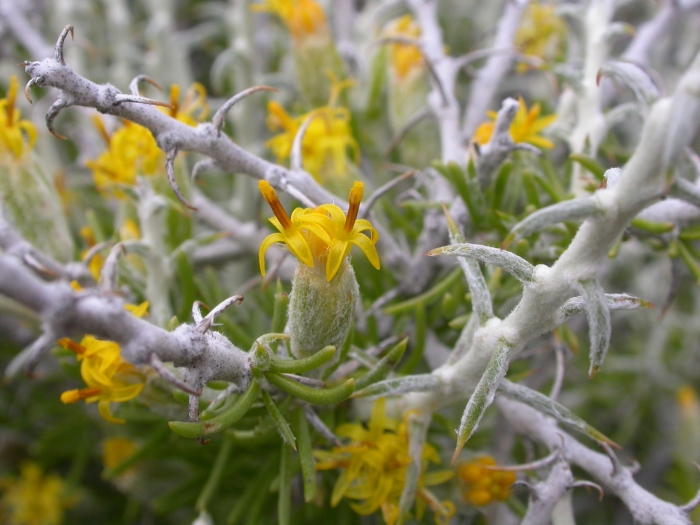Shortspine Horsebrush
(Tetradymia spinosa)
Shortspine Horsebrush (Tetradymia spinosa)
/
/

Matt Lavin
CC BY 4.0
Image By:
Matt Lavin
Recorded By:
Copyright:
CC BY 4.0
Copyright Notice:
Photo by: Matt Lavin | License Type: CC BY 4.0 | License URL: http://creativecommons.org/licenses/by/4.0/ | Rights Holder: Matt Lavin | Publisher: iNaturalist | Date Created: 2009-06-11T12:52:31-07:00 |

























Estimated Native Range
Summary
Tetradymia spinosa, commonly known as shortspine horsebrush, is a deciduous shrub native to the Great Basin and Mojave Desert regions, as well as the basins and plateaus west of the Rocky Mountains in the western United States. It is adapted to arid environments, often found in sagebrush communities, pinyon-juniper woodlands, and desert scrub habitats, particularly on alkaline soils in areas like playas and shadscale-dominated landscapes. The shrub typically reaches about 1 meter in height and is characterized by its narrow, curving leaves that harden into sharp spines, providing a unique texture in the landscape.
Shortspine horsebrush blooms from late spring to early summer, producing clusters of small, yellow disc flowers that are showy in their native arid settings. While the plant’s toxicity can be a concern for grazing animals, it is not typically a problem in cultivated gardens. This shrub is valued for its drought tolerance and is used in xeriscaping, naturalistic plantings, and habitat restoration projects. It requires minimal water once established, thrives in well-drained soils, and prefers full sun exposure. There are no popular garden cultivars of this species, and it is generally appreciated for its natural form and resilience. Gardeners should be aware of its spiny nature and potential toxicity to livestock.CC BY-SA 4.0
Shortspine horsebrush blooms from late spring to early summer, producing clusters of small, yellow disc flowers that are showy in their native arid settings. While the plant’s toxicity can be a concern for grazing animals, it is not typically a problem in cultivated gardens. This shrub is valued for its drought tolerance and is used in xeriscaping, naturalistic plantings, and habitat restoration projects. It requires minimal water once established, thrives in well-drained soils, and prefers full sun exposure. There are no popular garden cultivars of this species, and it is generally appreciated for its natural form and resilience. Gardeners should be aware of its spiny nature and potential toxicity to livestock.CC BY-SA 4.0
Plant Description
- Plant Type: Shrub
- Height: 1-3 feet
- Width: 1-3 feet
- Growth Rate: Slow
- Flower Color: Yellow
- Flowering Season: Spring
- Leaf Retention: Deciduous
Growth Requirements
- Sun: Full Sun, Part Shade
- Water: Low
- Drainage: Fast, Medium, Slow
Common Uses
Bee Garden, Drought Tolerant, Low Maintenance
Natural Habitat
Native to the Great Basin and Mojave Desert regions, as well as basins and plateaus west of the Rocky Mountains in arid environments
Other Names
Common Names: Spiny Horsebrush, Shortspine Horsebrush, Thorny Horsebrush, Longspine Horsebrush
Scientific Names: , Tetradymia spinosa, Lagothamnus ambiguus, Lagothamnus microphyllus, Tetradymia spinosa var. spinosa,
GBIF Accepted Name: